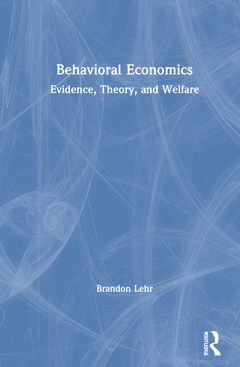Behavioral Economics Evidence, Theory, and Welfare
Auteur : Lehr Brandon

Behavioral Economics: Evidence, Theory, and Welfare provides an engaging and accessible introduction to the motivating questions, real-world evidence, theoretical models, and welfare implications of behavioral economics concepts. Applications and examples ? from household decisions, finance, public finance, labor, business, health, development, politics, education, energy, and sports ? illustrate the broad relevance of behavioral economics for consumers, firms, markets, and policy makers alike.
This textbook provides readers with both the intuition and analytical tools to apply behavioral economics concepts in understanding the complex social world. Each part of the book covers a key concept, beginning with a range of empirical evidence that is anomalous within the standard economics framework. In light of this evidence, a second chapter introduces and applies a nonstandard behavioral modeling approach. The last chapter of each part explores market reactions and policy responses to individuals behaving in nonstandard ways. Numerous exercises of varying types and levels provide readers the opportunity to check and enrich their understanding.
The book?s clear structure orients readers to the many concepts of behavioral economics. It also highlights the process by which economists evaluate evidence and disentangle theories with different social welfare implications. Accessible to students from diverse economic backgrounds, this textbook is an ideal resource for courses on behavioural economics, experimental economics and related areas. The accompanying Solutions Manual further extends learning and engagement.
Part I Foundations; 1. Introduction; 2. Standard Decision Making; 3. Behavioral Welfare Economics; Part II Intertemporal Preferences; 4. Discounted Utility Model Anomalies; 5. Present Bias; 6. Consumption Dependence; 7. Market & Policy Responses to Present Bias; Part III Reference-Dependent Preferences; 8. Reference-Independence Anomalies; 9. Reference Dependence; 10. Market & Policy Responses to Loss Aversion; Part IV Preferences over Uncertainty; 11. Expected Utility Anomalies; 12. Non-Expected Utility; Part V Social Preferences; 13. Self-Interested Preference Anomalies; 14. Social Preferences; 15. Market & Policy Responses to Social Preferences; Part VI Beliefs; 16. Belief Anomalies; 17. Nonstandard Beliefs; 18. Market & Policy Responses to Nonstandard Beliefs; Part VII Decision Processes; 19. Mental Accounting; 20. Inattention; 21. Market & Policy Responses to Mental Accounting & Inattention
Brandon Lehr is Associate Professor of Economics at Occidental College, Los Angeles, USA.
Date de parution : 08-2021
17.4x24.6 cm
Date de parution : 08-2021
17.4x24.6 cm
Thème de Behavioral Economics :
Mots-clés :
Expected Utility Preferences; Habit Formation Model; Present Biased Preferences; Randomly Assigned; Instantaneous Utility Function; Reference Dependent Preferences; Discount Function; Exponential Discount Function; Equity Premium Puzzle; Ceo Overconfidence; Loss Aversion; Present Bias; Discounted Utility Model; Decision Utility; Base Rate Neglect; Mental Accounting; Utility Function; Equity Premium; Endowment Effect; Allais Paradox; Public Good Game; Ellsberg Paradox; Ultimatum Game; Gambler’s Fallacy; Reference Dependent Utility



